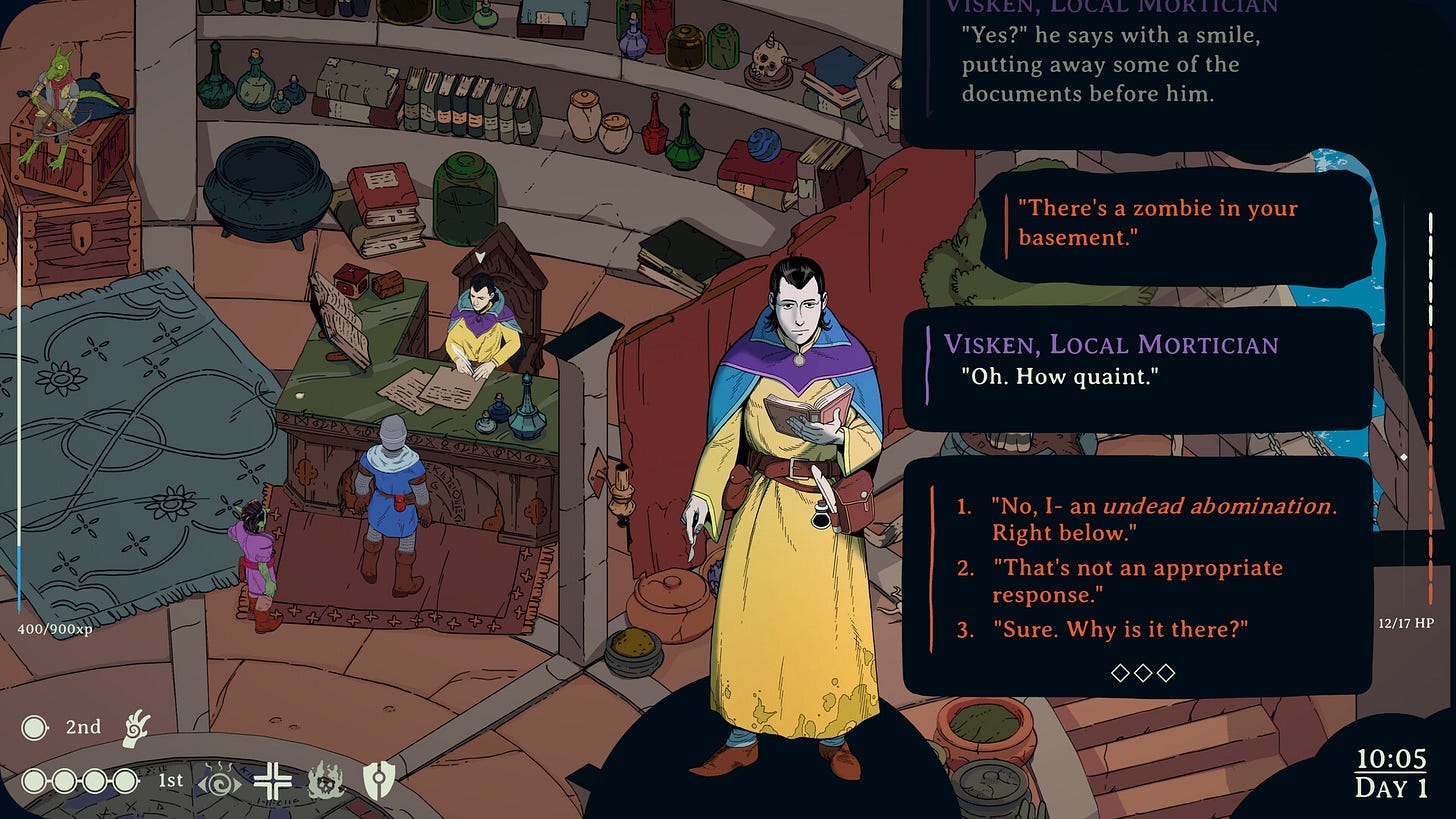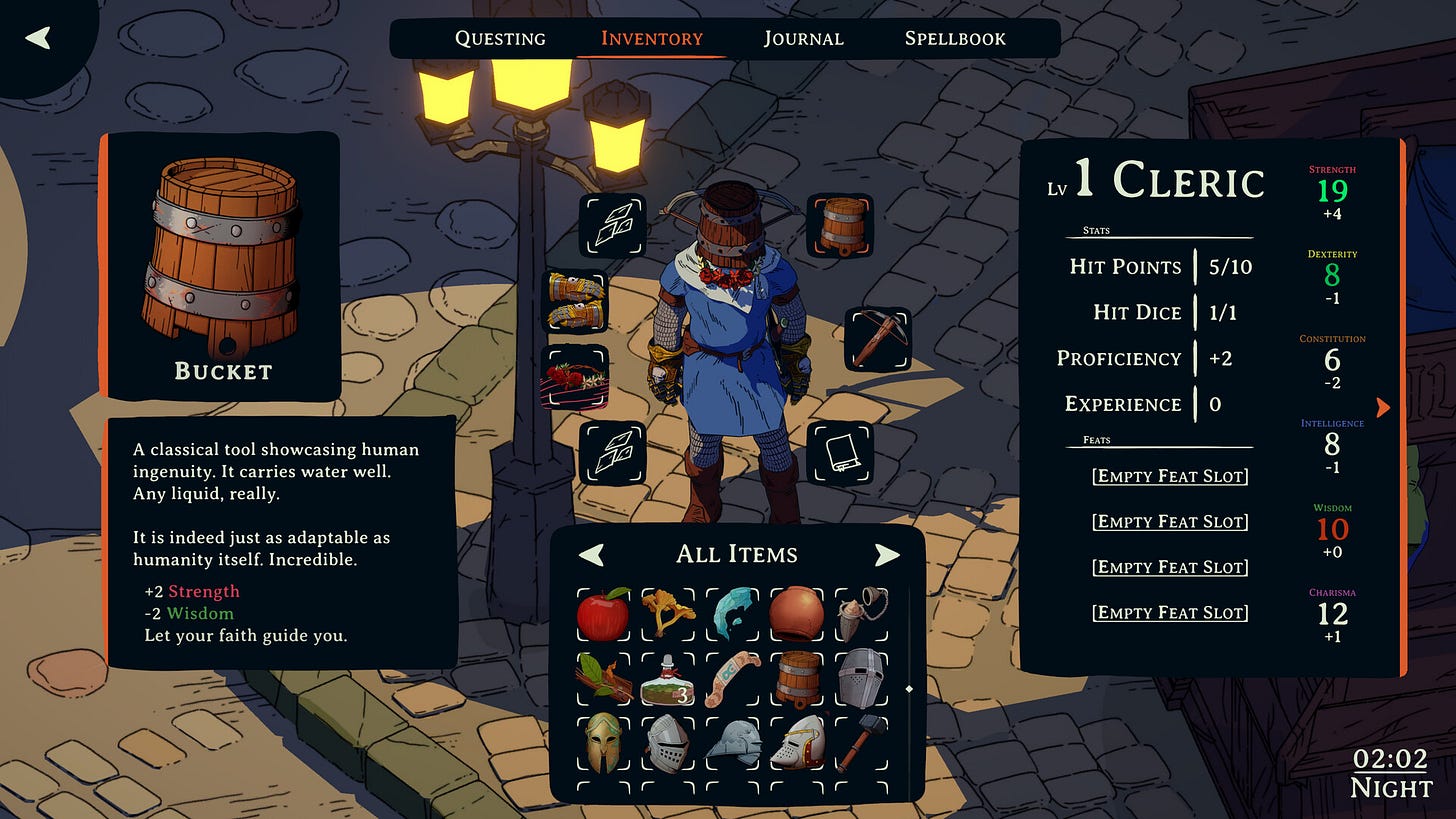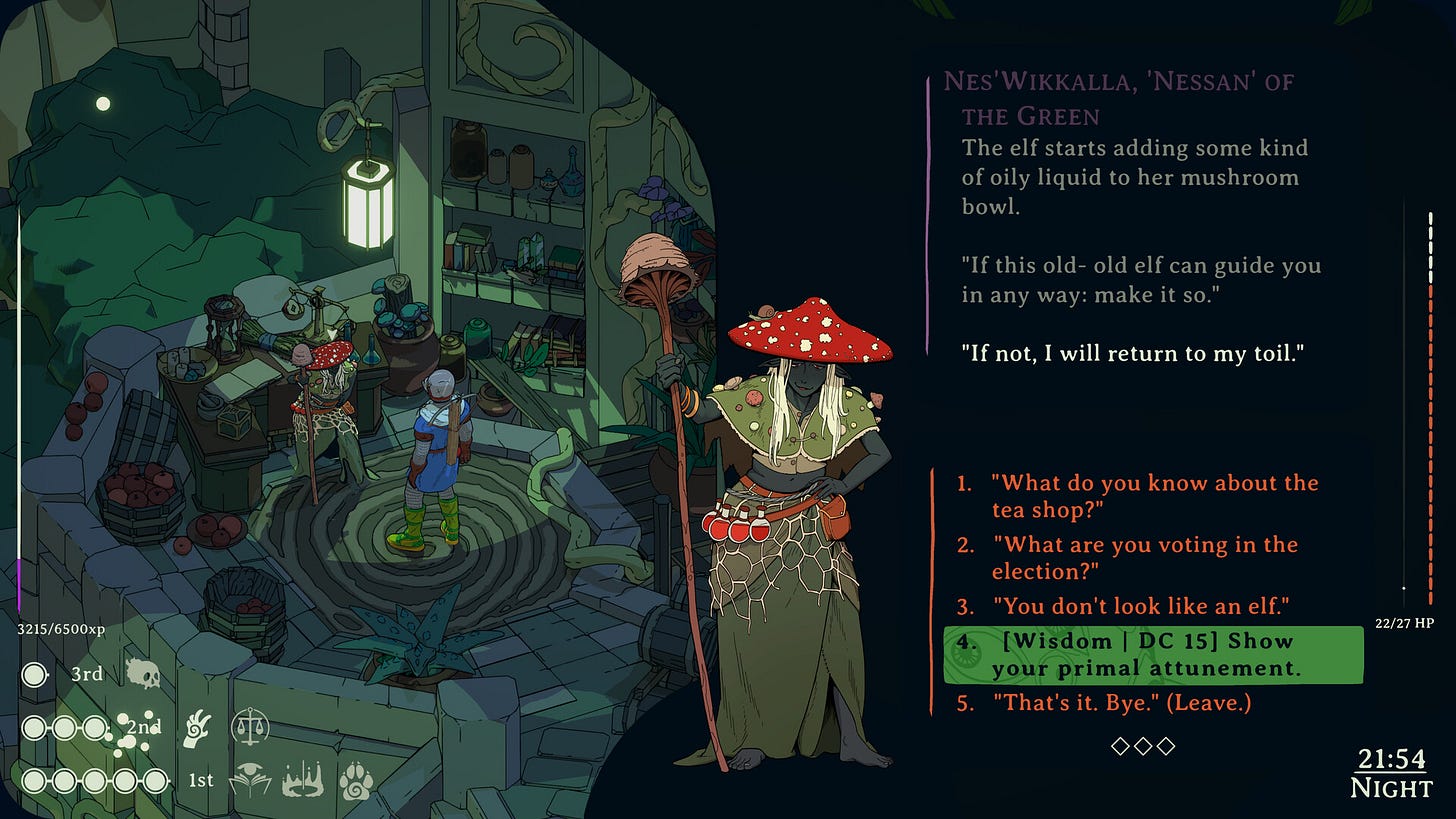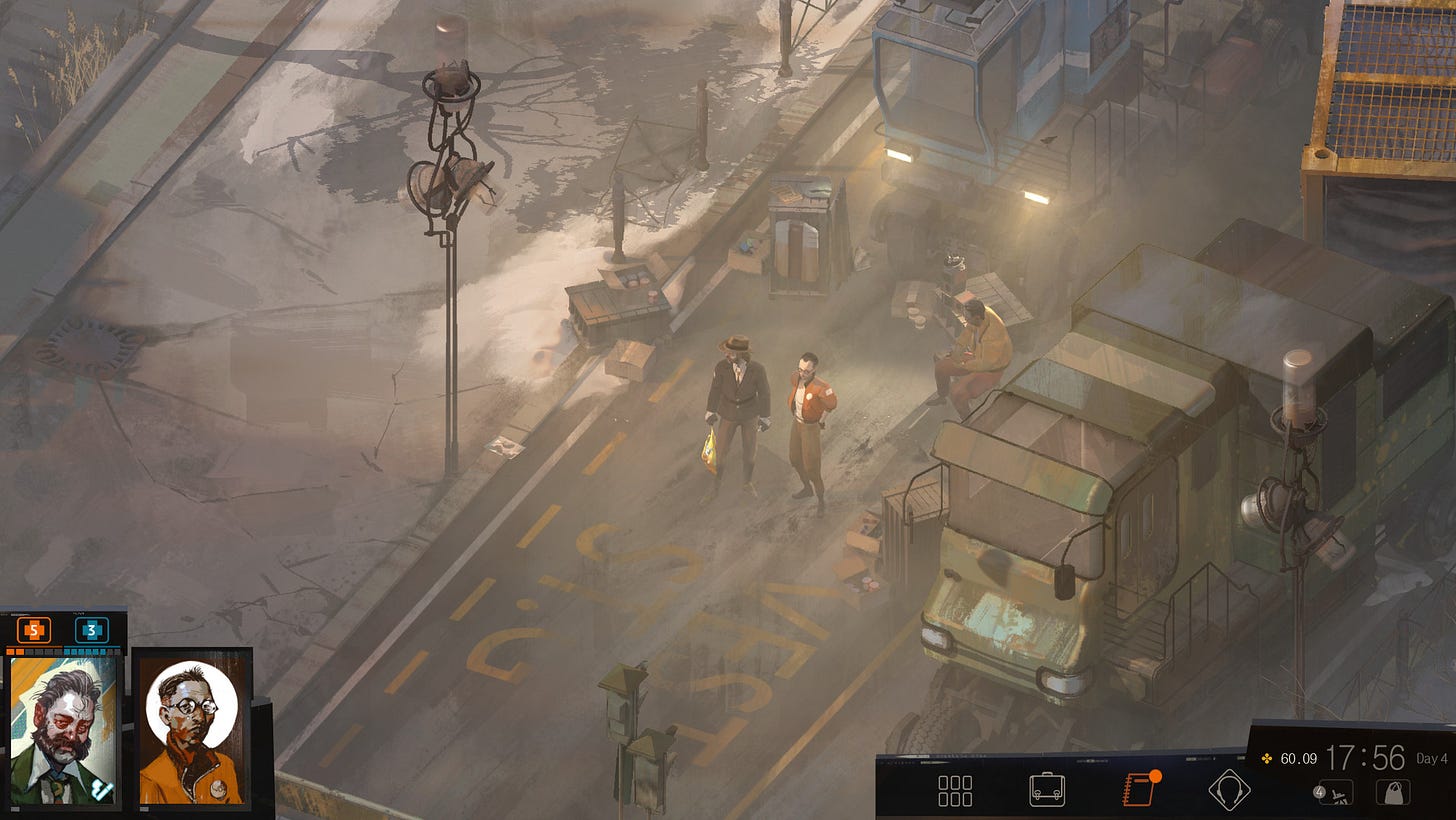Is fail-forward the future for CRPGs?
What does it mean to put the playfulness back in role-playing games?
My guest for this issue of Multiplier is Christoffer Bodegård, the developer behind the upcoming single-player CRPG Esoteric Ebb. I’m genuinely really looking forward to playing this one once it releases so it was a delight to bounce a few emails back and forth with Bodegård as part of this year’s LudoNarracon. You can follow him on Bluesky.
Fergus: Directly or not, the influence that roleplaying games like Dungeons & Dragons have had on Esoteric Ebb is easy to grasp. The adventures of the world’s worst cleric don't take place in the Forgotten Realms but the swords & sorcery setting in the game isn't that far off either in terms of the familiar imagery it's playing with. However, as opposed to something like Baldur's Gate 3, Shadowrun Returns or Disco Elysium, the tone of that world and the characters is more playful than it is grounded. Even if there's room for jokes, I think the fact that these games take their stories so seriously does subtly encourage you as a player to buy into the fiction and care more about the characters involved.
Esoteric Ebb seems to zag in the other direction and in my opinion there's an honesty behind that choice. For many people, the experience of actually playing fantasy RPGs like D&D often veers closer to slapstick than serious. Anyone involved with the culture around TTRPGs already well knows that you're only ever one bad roll away from unexpected comedy and, in line with its inspirations, it feels like one of the big design choices in Esoteric Ebb is the idea that you should roll with the failures and see where those fumbled rolls take you. What inspired you to put the playfulness back in roleplaying games? Was it something that you brought into the project based on your own experiences as a player or as a GM/DM?
Christoffer: You’re right on the money there. Esoteric Ebb is, beyond an attempt at a coherent story, a digital simulation of my DM:ing style. It differs between campaigns of course, but generally my goal is this: ridiculous realism. The rules of the setting can be crazy and esoteric, but the characters have to be real. This was mostly born from my OG play group, in which all my players have that exact mindset. When they play, they don’t view it as a story but rather as a simulation for themselves, for good and bad.
This is what inspired that tone in Ebb. When you cast Charm Person on someone, it’s treated with the same weight as an actual mind control spell would be treated in our world. Same thing with polymorphical potions (PPs!) or scrying magic (privacy nightmare). It’s horrifying. But it’s in that whiplash to what we expect from fantasy tropes, as well as having a protagonist with a propensity for extremist behavior, where I believe most of Ebb’s comedy is born. That, and specifically having real people deal with it. Wacky slapstick is, in my very subjective opinion, only funny in juxtaposition.
Same with the dice rolling, and all the other 5e-variant homebrew rules I’ve stuffed into this Disco-formula. It’s just my personal way of running TTRPGs. I show players as much information as possible to maximize agency, always rolling openly and making sure they know DCs. Failure should be as interesting, if not more, than success. And finally, everyone has to be onboard. Always. In Esoteric Ebb you can just reload a save if you get annoyed with an outcome, but my goal as a DM should be to make you feel like you never have to. At my table, if your character dies, it should only happen because you knew the risks and accepted the outcome - and ultimately had fun.
Fergus: I totally agree. Traditionally one of the biggest things that digital roleplaying games have borrowed or modeled from their tabletop counterparts has been that pursuit of the power fantasy. Given that many and more modern TTRPGs have leaned in and embraced the potential of fail-forward storytelling and gameplay, it’s no shock that digital analogues like Disco Elysium and Citizen Sleeper are trying to do the same. Success means nothing without the risk of failure but the latter doesn’t have to be boring and can often push things in a more interesting or unexpected direction.
It’s a marked contrast to where roleplaying games were ten or twenty years ago, there was a real emphasis on player choices and morality. Good versus evil, all that stuff. However, rather than mediating success from failure, the illusion of those choices was that you were more often than not just choosing which set of train tracks you wanted to take to the same ultimate destination. In some ways, it was less about winning or losing and more about allowing the player to express and determine what winning looks like. Why do you think that dealing with failure and risk has evolved into such a prominent fixture of RPGs in recent times? Is it as simple as developers taking after the new tabletop RPGs they themselves are playing or is there something more to it?
Christoffer: One part is just the broader zeitgeist shift from morality to character-based storytelling overall, which games follow along. But as for the lesser focus on railroading, I would argue the industry has matured a bit and realized the strengths and weaknesses of interactive writing, leading to a clearer split.
Looking at AAA narrative games (I’m thinking God of War and The Last of Us) of the last 15 years, they rarely even attempt interactive writing - instead focusing entirely on linear writing within interactive systems. Clearly, this has worked in their favor. If these games were made a few generations prior, they might have had those morality systems (RDR2 is a good modern example), with multiple endings and minor, not-so reactive story-branching. I think it’s great that games have achieved such success in linear storytelling, but I don’t feel that much more of an incentive to play a game like that than watching a fresh new TV series tackling similar themes.
Disco Elysium in comparison just does the thing digital RPGs have experimented with since the late 80s: in-depth interactive writing sometimes mixed with systematic storytelling - I love Citizen Sleeper as an example of the former specifically. But something I’ve ruminated on is exactly why Disco (and Planescape: Torment) stand out as such great examples - and it’s probably partly because of what you say about failing forward. If every failure resulted in a BAD END and a Quick Load, then that removes everything exciting about choice and risk. If you’ve ever heard someone complain about the swingy nature of the d20, this is partly what they’re talking about.
Its modern resurgence shows the popularity of D&D not as a war gaming system with backstories, but as a primarily collaborative storytelling tool. And to actually answer your question, this popularity is absolutely involved in the new wave of interactive storytelling games. Turn-based combat games are great, but it’s that narrative part of TTRPGs that’s the most difficult to emulate digitally. That’s what makes me so excited to see more games take on that challenge.
Fergus: It really does feel like the breakout success of Disco Elysium has inspired an entire wave of developers in much the same way that Planescape: Torment did way back in the day. The legacy of the latter looms large but DE feels like a more authentic successor than Tides of Numenera ever was.
The inspiration and influence of ZA/UM’s work on Esoteric Ebb is well documented at this point but I’d love to pick your brain about the broader wave of Disco Elysium “spiritual successors” that have cropped up around your game. Are there any that you think seem to be on the right track or are they setting themselves up to fall short? Do you think it’s even possible to emulate or recreate the blend of style and substance that made DE resonate so widely or even untangle the two from one another?
Christoffer: Oh yes! I’ve been keeping watch on each and every ‘Disco-like’ I’ve come across - playing every available demo and analysing the writing/design. Really fun. Rue Valley is the biggest at the moment, with an absolutely SICK art direction. Looking at their Steam tags and general design, I’d say they’re leaning away from RPG and more towards Point-and-Click, which brings a slew of subtle but rather important differences to the interactive writing. Then there’s Glasshouse, Travelling At Night, Clam Man 2, Sovereign Syndicate, The Necromancer’s Tale, and a bunch others (I’ve got a full list pinned in the Ebb Discord) that all lean in one direction or another.
But those are just the non-ZA/UM-affiliated ones. With all the drama surrounding their balkanization it’s difficult to say too many positive words. But my hope is simple: artists getting the chance to create great art, under good terms. Preferably actually owning said art as well.
As for what makes a ‘Disco-like’ actually ‘good’? That one’s hard. After all, everyone comes out of Disco Elysium with a different view on what makes that game special. Personally, I try not to publicly critique other games too much - partly because I’m not a reviewer and partly because I have a very, very specific taste. But, if I were to summarize almost all subjective feedback I tend to give to developers making games like this, it comes down to my concept of interactive writing. Which is:
A high choice-to-text ratio.
>50% of content being dynamic.
An open-ended design.
The first one makes me not fall asleep, the second keeps agency high (while making the game an actual RPG), and the third gives me that TTRPG-feeling of complete and utter freedom. In Esoteric Ebb, 90% of dialogs are skippable. Most content can be approached in any order. So basically, extreme non-linearity is the thing I took away from Disco Elysium. Or rather, the ability to be non-linear while still telling a damn good story.








